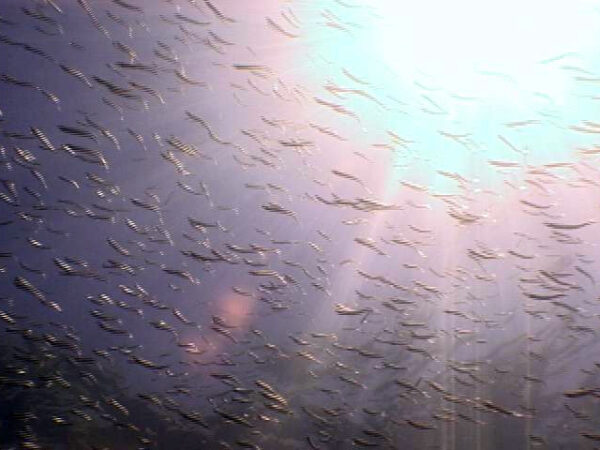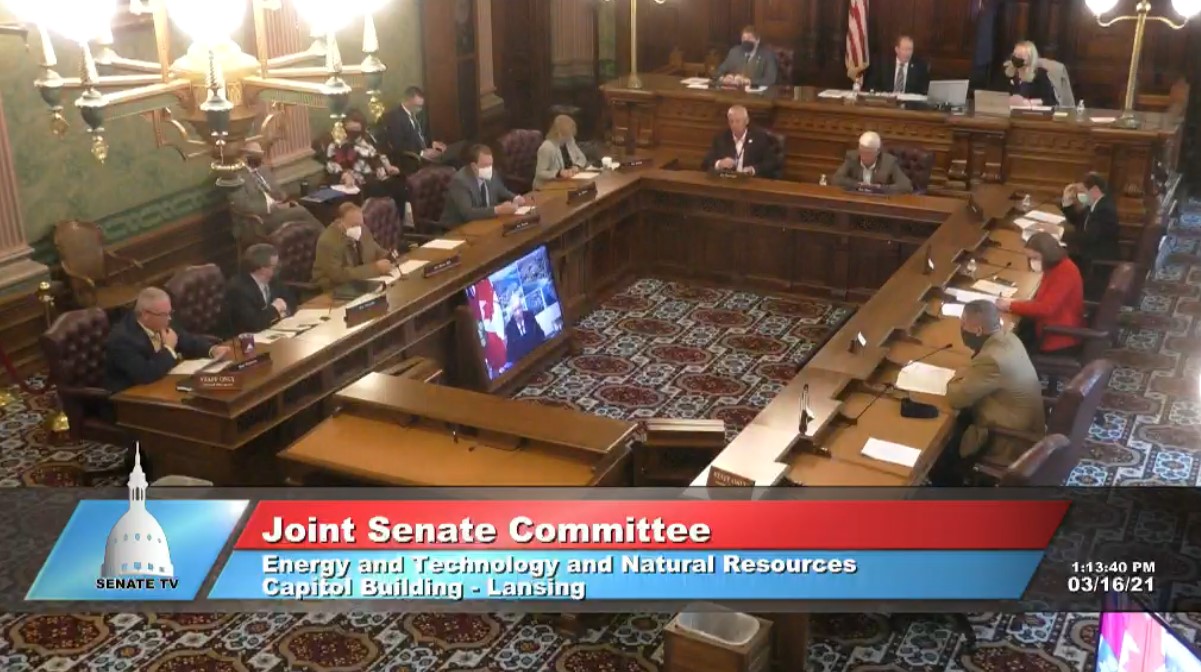
In the ongoing conflict over Line 5’s presence and future in Michigan, much of the debate has been between the Canadian energy company Enbridge, Inc. and the state of Michigan, or between Michigan environmentalists and Michigan businesses.
A recent joint committee session in the Michigan Senate heard from a third party: Canada.
At the March 16 joint session for the Natural Resources and Energy and Technology committees, senators talked to representatives from Canadian government and industry: Ontario Provincial Parliament member Bob Bailey; Ontario Chamber of Commerce President and CEO Rocco Rossi; and International Vice President and Regional Manager for Central and Eastern Canada of the Laborers’ International Union of North America Joseph Mancinelli.
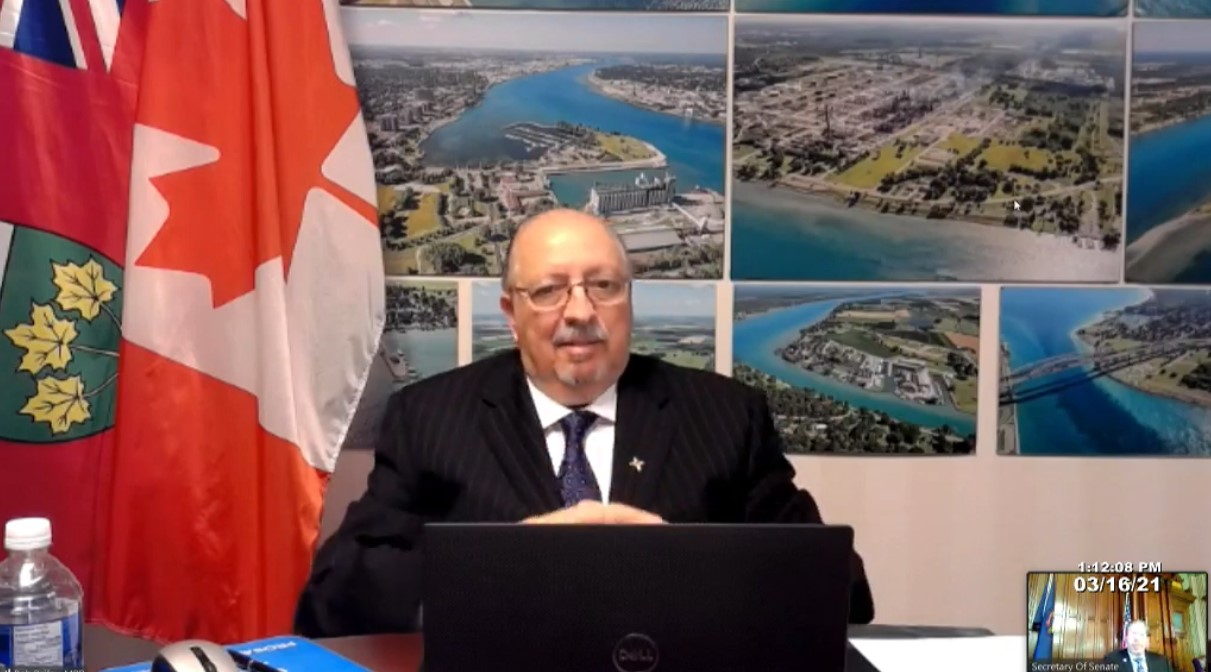
Ontario Provincial Parliament member Bob Bailey spoke at the March 16 joint session for the Michigan Senate Natural Resources and Energy and Technology committees. (Image from Michigan Senate stream)
The trio’s focus was the economic impact shutting down Line 5 would have on Canada’s – and specifically Ontario’s – economies.
“Without (Line 5), Ontario would face a staggering 45% reduction in pipeline supply of petroleum,” Bailey said.
Bailey, who represents Sarnia-Lambton, also said a shutdown of Line 5 would impact 4,900 direct and 23,000 indirect jobs in his area.
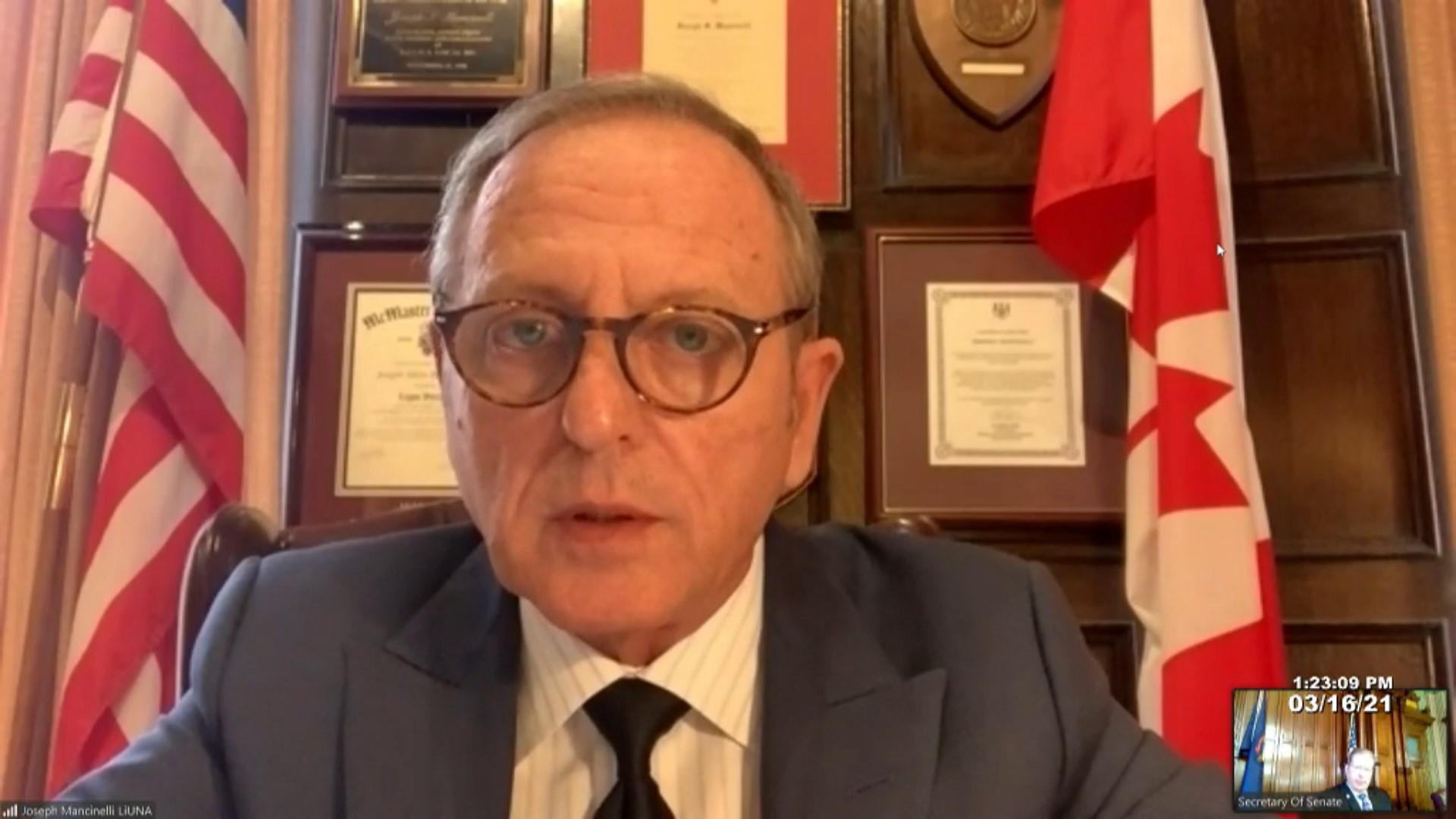
International Vice President and Regional Manager for Central and Eastern Canada of the Laborers’ International Union of North America Joseph Mancinelli spoke at the March 16 joint session for the Michigan Senate Natural Resources and Energy and Technology committees. (Image from Michigan Senate stream)
On a larger scale, Mancinelli pointed to the agricultural sector and the cosmetic, sporting goods, pharmaceutical, electronics and auto industries.
“That’s the misconception here, that we’re only using it for our cars, to drive cars and jets, to use the fuel to get us around, and that’s not it at all,” he said. “That fuel that runs through that pipeline is used to make the very products that all of us depend on, and it’ll take decades… to move away from using petroleum to make those products.”
Related stories on Great Lakes Now:
With Line 5 closure, a ‘game of chicken’ over how to heat Upper Peninsula
Michigan Gov. Gretchen Whitmer’s administration released on Friday a plan to address propane needs in light of a Line 5 shutdown, based on an assessment of statewide energy needs by the Michigan Public Service Commission and a 2020 report from a U.P. energy task force.
This is following a November order from Whitmer giving Enbridge until May 13 to shut down the pipeline, citing that a 1953 state easement violates the public trust doctrine.
In discussions in their own committee meetings, Canadian officials have brought up the 1977 Transit Pipelines Treaty between the U.S. and Canada which states that no public authority in either country can impede or interfere with cross-border transmission of oil.
“I don’t think at the end of the day this is an Ontario issue or exclusively a Michigan issue, it is a North American issue,” Rossi said. “And I do believe that beyond our state and provincial jurisdictions that our respective federal governments also have to be involved because pipelines fall under a binational treaty that both countries signed, and we fully expect the terms of that treaty to be upheld.”
Senators brought up a range of concerns both in support of and in opposition to the pipeline shutdown.
Sen. Ed McBroom, R-Vulcan, said Whitmer’s plan does not address the threat of a fuel shortage and talked about the role of natural gas in nitrogen fertilizer production, which is important to agriculture.
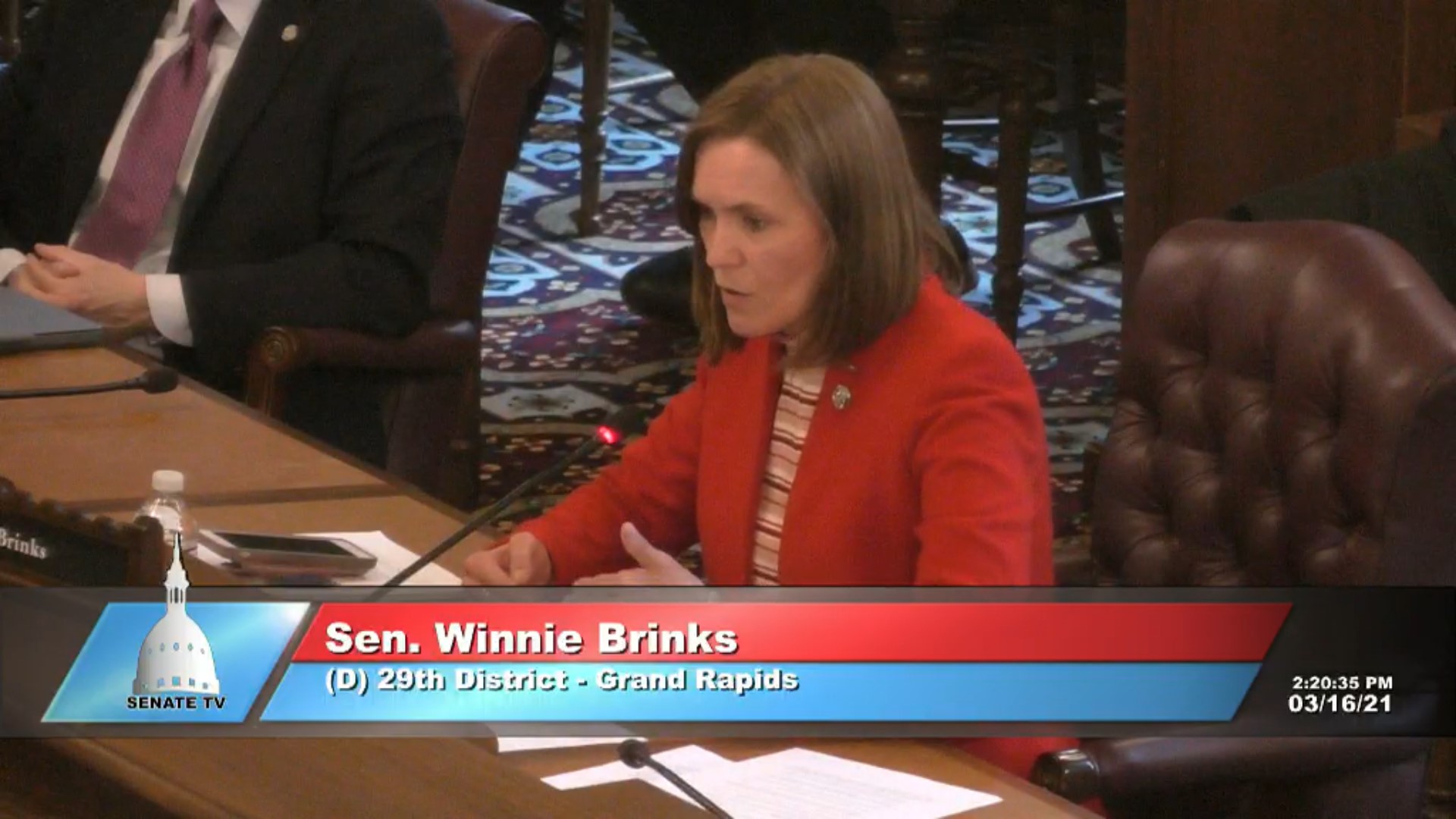
Sen. Winnie Brinks, D-Grand Rapids, spoke at the March 16 joint session for the Michigan Senate Natural Resources and Energy and Technology committees. (Image from Michigan Senate stream)
Sen. Sean McCann, D-Kalamazoo, pointed to the Enbridge Kalamazoo River oil spill in 2010, one of the worst inland spills in U.S. history, and the potential negative impacts on Michigan jobs and health that would come with another massive oil spill.
“When we talk about jobs and economic opportunity, I don’t think it’s fair to say that this pipeline enables us to have all these jobs without recognizing that the loss of the Great Lakes would also cause a loss of millions of jobs or the significant pollution of that lake could,” Sen. Winnie Brinks, D-Grand Rapids, also later added.
Related stories on Great Lakes Now:
Turtle Recovery: Studying turtles on the Kalamazoo River 10 years after Enbridge oil spill
“I can sum it up in one word, and that is: nightmare.” 10 years after massive oil spill in Michigan
API key not valid. Please pass a valid API key.Bailey cited Enbridge paying for the cleanup after the Kalamazoo incident and talked about how the tunnel project is designed to prevent incidents like that from happening.
“The lines across the Straits of Mackinac have ran for over 65 years with no incidents,” Bailey said.
Bailey’s claim is true in the Straits of Mackinac, although Line 5 “has spilled at least 1.13 million gallons of oil in 29 incidents since 1968” from other sections of the pipeline, as reported by MLive in 2017.
Sen. Marshall Bullock, D-Detroit, brought up the incident in which an anchor struck and damaged Line 5 in 2018 – with another incident happening in 2020 as well, although neither resulted in an oil spill.
“It is the cost of shutdown versus the cost of shutting down due to catastrophe,” Bullock said. “We avoided a catastrophe by a stroke of luck, and we’re operating as if that didn’t happen.”
Watch Great Lakes Now‘s Emmy-winning documentary on the Line 5 pipeline:
API key not valid. Please pass a valid API key.
Sen. Marshall Bullock, D-Detroit, spoke at the March 16 joint session for the Michigan Senate Natural Resources and Energy and Technology committees. (Image from Michigan Senate stream)
Bullock asked about safety measures and plans in place in case a spill happened.
Bailey described some of the security measures Enbridge put in place following those incidents and said the company would likely be willing to come before the committee to speak more about their plans.
Environmental groups criticized the decision to hold an “all-Canada” panel.
“To get at the truth of the Line 5 threat in Michigan you would actually need to hear from credible people and organizations in Michigan who have analyzed and examined Line 5 and provided well-documented reasons for why Michigan’s priority around Line 5 should be Michigan, which means protecting the Great Lakes,” said David Holtz, spokesperson for the coalition Oil & Water Don’t Mix.
The National Wildlife Federation’s Great Lakes office and Clean Water Action Michigan also both live tweeted criticisms of some of the claims made by the three witnesses.
The Line 5 shutdown order does not affect Enbridge’s ability to continue pursuing the tunnel replacement project. In January, the Michigan Department of Environment, Great Lakes, and Energy approved two permits Enbridge needed for the tunnel project. Enbridge is still waiting on permits from the Michigan Public Service Commission and the U.S. Army Corps of Engineers.
Michigan Attorney General Dana Nessel’s lawsuit against Enbridge remains on the Ingham County Circuit Court docket, awaiting a decision by Judge James Jamo. The suit Enbridge filed against the state of Michigan in the U.S. District Court for the Western District of Michigan after Gov. Whitmer revoked its easement remains on that docket as well.
The Biden administration has not taken a stance on the Line 5 pipeline.
Catch more news on Great Lakes Now:
Treaty Rights Acknowledged For First Time in Oil Pipeline’s Controversial History
EGLE Permits: Michigan agency approves permits needed for Enbridge tunnel project
Legal Translation: Environmental attorney explains the latest on Enbridge Line 5 news
API key not valid. Please pass a valid API key.Featured image: A trio of Canadian representatives spoke at the March 16 joint session for the Michigan Senate Natural Resources and Energy and Technology committees. (Image from Michigan Senate stream)




